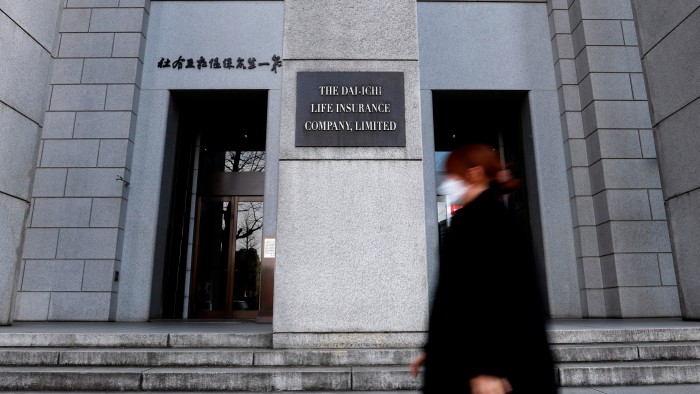Unlock the Editor’s Digest for free
Roula Khalaf, Editor of the FT, selects her favourite stories in this weekly newsletter.
Activist investor Farallon Capital Management has taken a top-three position in one of Japan’s largest insurance groups and is pushing for rapid changes in investment and governance, as it aims to tap opportunities on the “final frontier” of the sector.
The San Francisco-based firm has built a stake of between 4 and 5 per cent in T&D Holdings and is pushing for it to reduce investment risk at a faster pace, concentrate on its core insurance business and address its conglomerate discount, according to people familiar with the matter.
It has also proposed the appointment of two new external directors, say the people, arguing that the current board lacks sufficient experience and is ill-suited to judge its mergers and acquisitions push abroad.
However, the company, which has a market value of $12bn, has already declared its opposition to Farallon’s board candidates. Its annual meeting is set for June 26.
In a 63-page presentation, T&D has pushed back against many proposed changes, without naming the firm, and said its board could not confirm the candidates met the requirements for outside directors or “would contribute to enhancing corporate value”.
Farallon, which describes itself as an engagement fund, is understood to have had a constructive dialogue with T&D since 2023, but the people add that it believes the company could move faster to strengthen the business.
The fund, which declined to comment, has been a shareholder of varying sizes since 2008. T&D, whose share price has risen 14 per cent this year, did not immediately respond to a request for comment.
Farallon, with $42bn in assets under management, has been increasingly vocal in its shareholder activism in Japan, becoming emboldened by the Tokyo stock exchange’s own corporate governance reform crusade.
It made its name in the country with high-profile bets, including a contentious engagement with Toshiba, where it successfully installed an outside director shortly before the conglomerate was taken private.
In its first big public move since exiting its roughly $800mn position in Toshiba in 2023, Farallon earlier this year announced a stake in Astellas, one of the country’s largest pharmaceutical companies.
Activists have targeted companies from across the tech sector to auto parts, but the highly regulated insurance sector has remained largely untouched.
Singapore-based fund Effissimo Capital Management is one of the big exceptions, having taken large positions in Dai-ichi Life and Life Net, in which Farallon was also the first investor.
Alongside what Farallon believes is a strong underlying business, particularly the fast-growing Daido Life unit, the fund believes T&D can capitalise on the growing interest from private equity in Japanese insurance liabilities.
Private equity firms can, for example, buy blocks of policies that have become costly for insurers to maintain, due to capital requirements and low interest rates. Buyout firms can better manage their cash flows by employing higher-yielding investment strategies. Apollo’s merger with Athene in the US in 2021 is seen as one template.
Many firms are hoping that Japan can provide the next leg in the industry’s development. Apollo already has an office here, along with Athene, and KKR has a strategic alliance with Japan Post Insurance, through its Global Atlantic arm.
“Japan seems to be the final frontier of high-quality liabilities . . . it has a huge number and they are largely untapped,” said one senior person in the industry.
So far, most deals in Japan have been modest, with industry insiders citing regulatory caution as the reason why more aggressive moves, or complete takeovers of companies, have not happened.
One of Farallon’s other main concerns at T&D is that the company takes too much equity risk and thus prioritises investment over insurance, without making the returns necessary to justify that decision.
The fund, according to the people, believes T&D has greater cross-shareholdings than appreciated, as it has designated some of its stakes as “pure investments” — a classification with which the fund does not agree.
“The stocks reclassified from strategic shareholdings to pure investments are managed by the asset management division, which decides whether to continue holding or sell them,” said T&D in its presentation. “Under the equity risk reduction policy, approximately 39 per cent of the cumulative amount reclassified as pure investments has been sold to date.”
https://www.ft.com/content/1295645b-4bd8-43e0-84f8-6aa6d6607904


